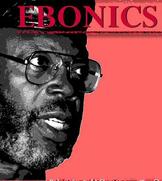Black Language is a style of speaking English words with Black Flava—with Africanized semantic, grammatical, pronunciation, and rhetorical patterns. [Black Language] comes out of the experience of U.S. slave descendants. This shared experience has resulted in common language practices in the Black community. The roots of African American speech lie in the counter language, the resistance discourse, that was created as a communication system unintelligible to speakers of the dominant master class.
-Geneva Smitherman, "Word From the Mother", 2006
Ebony + Phonics = EbonicsNavigatin' the Syllabus...
What's Good?!...YOUTUBE ALERT: Geechee Experience ain't new to this! They been outchea educating the people about Gullah Geechee Language and the Geechee experience. Follow them on YouTube and Instagram.
PODCAST ALERT: Check out Anansa Benbow's new podcast, The Black Language Podcast. It's straight FIYAH! Also, see her TedX talk, Grammar Skool, below.
BOOK ALERT: April Baker-Bell's new book, Linguistic Justice: Black Language, Literacy, Identity, and Pedagogy, dropped in May 2020. See the trailer for Linguistic Justice below.
|
Our mission for the #BlackLanguageSyllabus is to celebrate the beauty of Blackness and Black Language, fight for Black Linguistic Justice, and provide critical intellectual resources that promote the collective study of Black Language. The #BlackLanguageSyllabus builds on the digital origins of other Black radical digital education resources and digital hashtag syllabus projects, such as #LemonadeSyllabus,
#SayHerNameSyllabus, #BlackFeminismSyllabus, and the Abolitionist Teaching Network, that are open access and created outside of traditional academe to reshape how knowledge is produced, affirmed, and accessed. We recognize that anti-Blackness and anti-Black linguistic racism are ubiquitous, and with the current war on critical race theory and antiracist education, we ain't got time to be waiting on schools and society to celebrate or educate us about our language, so we created the #BlackLanguageSyllabus as a space for political discussions and praxis of Black Language as guided by the work of teacher-researcher-activists in classrooms and communities who stand against institutions that seek to annihilate Black Language + Black Life. Like other #hashtag syllabi, the #BlackLanguageSyllabus is for Black Language speakers who are looking to re-educate themselves about our mother tongue, academics and educators looking to reimagine their classroom curricula and pedagogies, and for anyone who is interested in learning about Black Language + Black liberation. [NOTE: If you cannot move past denigrating Black Language, in any way or form, then please know that this site was not created for you.] The 2o21 Black History Month Edition Is Here Black Linguistic Justice...Hit Us Up...
|
Salute...

We honor the memory of Dr. Robert L. Williams who transitioned to the ancestral realm on August 12, 2020. Dr. Williams coined the term Ebonics (a combination of “ebony” + “phonics”) in 1973, and he edited the book Ebonics: The True Language of Black Folks, which explained the African roots of Ebonics and refuted the popular conception that Ebonics was simply slang or deficient English. We honor the work of Dr. Williams through the #BlackLanguageSyllabus and our continued fight for Black Linguistic Justice. Rest in Power!
|
I deeply hope that more of us will want to learn to protect Black language. If we lose our fluency in our language, we may irreversibly forsake elements of the spirit that have provided for our survival.
-June Jordan, "White English/ Black English: The Politics of Translation", 1972






